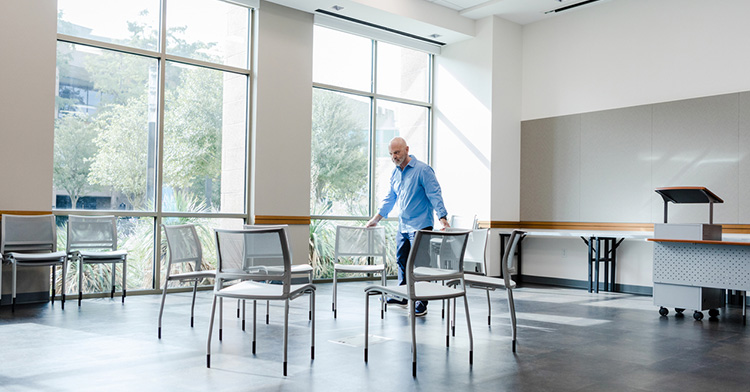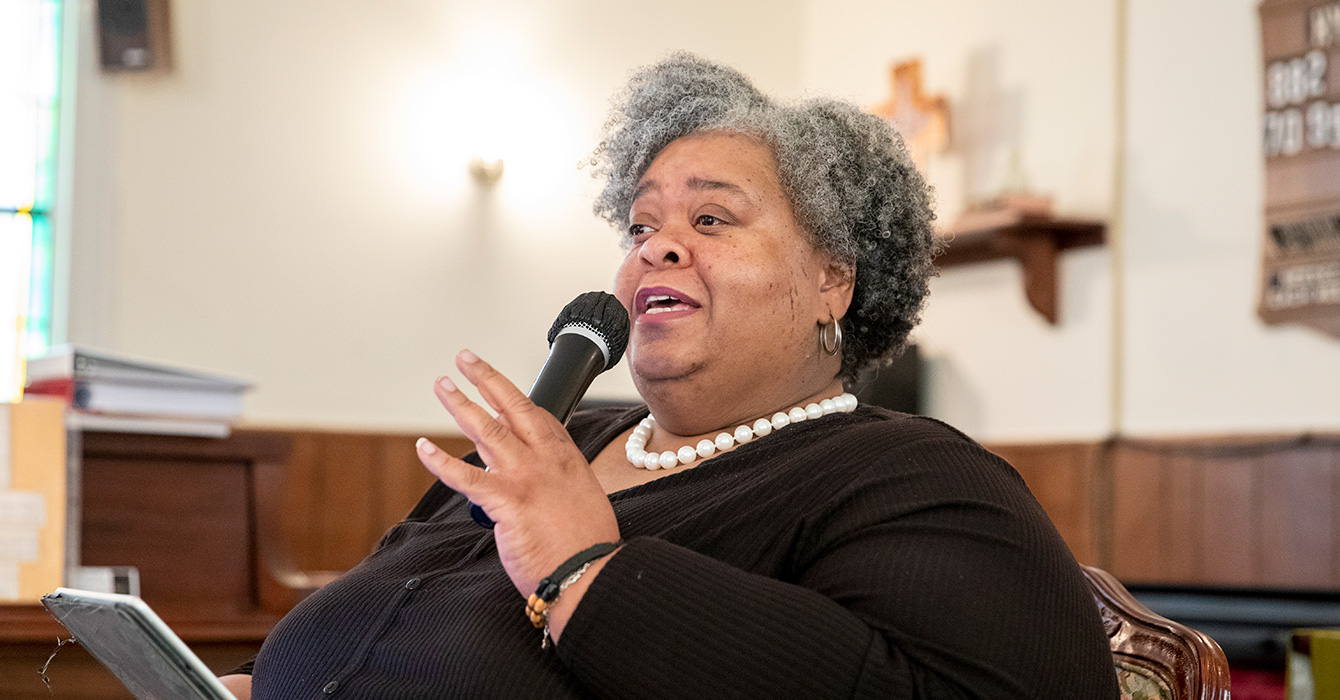Cuh-thunk.
The lenses on the optometrist’s equipment clicked into place as she asked me to read the next line on the eye chart. It was a new experience for me, at age 40. I had been lucky enough to not need glasses before and had annoyed my bespectacled husband no end with my bravado about my 20/20 vision.
But lately, seeing clearly had gotten a little more difficult. When the optometrist shifted the lens in front of my eye, that tiny adjustment changed things. Strain gave way to ease. Sometimes, we just need the right lens.
Strain seems to be a common feeling these days among the clergy I know — and even more so among those of us balancing multiple jobs. I’ve been a bivocational pastor for my entire career — that term a gussied-up, spiritualized way of saying, “I have a second job to make ends meet.” A euphemism for being caught between a rock and a hard place.
Without the time, energy and, often, the congregational resources to make churches look like they used to, we may feel most of the time as if we are failing. If not one job, then the other; if neither of those, likely our families or our own selves.
Bivocational or not, pastors and church leaders know the challenges of leading under the weight of capitalism that continues to press our people (and us) for our time, energy and precious resources. The difficulty of leadership in a moment when it feels like democracy is at stake. The sense of ineffectiveness that threatens to crush us when we look at the world’s big problems.
What we are in desperate need of is something — at the very least — to ease the strain.
I think bivocational clergy have a kind of superpower, just like the optometrist: we are equipped with extra lenses. My bivocational lens comes from my work as a therapist, a second career I pursued in hopes of turning necessity into something that felt like a vocation. My lenses inform one another, the light refracting and reframing as it bounces from parish to community mental health and back again.
One of the most influential clinicians in the development of talk therapy in the 20th century, Carl Rogers, is known for creating person-centered therapy. Rogers believed that each person should be seen through a lens he called “unconditional positive regard.” In “On Becoming a Person: A Therapist’s View of Psychotherapy,” he wrote that acceptance and warm regard are vital to creating a relationship in which change can occur. He described that relationship as the necessary ground of healing.
This was a revolutionary new way of thinking about mental health work, so much so that Rogers was ridiculed at the time for doing “nothing” — just warmly reflecting the person across from him! Instead of entering each encounter with judgment, Rogers suggested being open to the other person as an expert in their own experience. Instead of beginning with diagnoses and assumptions, he recommended beginning by looking for what was right about the person, empathizing as a way into the kind of accepting, understanding relationship in which healing can begin to emerge.
I can’t help wondering whether Rogers (who started out in seminary before he went into psychology) was drawing from the perspective of another lens: the unconditional love of God. We should be experts in this field — it is the very love and acceptance God has offered to us. But so often, we find ourselves left to strain and tire without the lens of love, which is so easily forgotten in our exhaustion, in our pain.
Interestingly, Rogers also advocated for clinicians to apply this kind of acceptance and warm regard to themselves. He believed that only when he was aware enough to know what he was feeling in the encounter with another and to accept it — whether the feeling was disgust or frustration or fear or joy — only then could he be authentically present to the other person.
I wonder what keeps us from acknowledging the fear and pain that emerge over and over — and how much it would ease the strain to accept these honest emotions, warmly and with love.
Consider our leadership meetings: the drooping, tired eyes, the lack of engagement with new ideas, the weariness as we look at numbers on a spreadsheet. Just like the strain of trying to see through an outdated eyeglass prescription, our exhaustion and anxiety about the future, our fear that we may already be failing, alter our perception of what is in front of us. The meeting ends with frustration, fatigue and declining hope.
If we could change out the lens, what would we see? The drooping, tired eyes belong to someone who turned up for a weeknight meeting after a 12-hour shift. They reflect a person with a deep commitment to the community. What we are doing matters enough for that person to expend the last shred of a day’s energy.
The spreadsheet numbers may show decline. Yet seen in another way, they also reflect the remarkable commitment of people who continue to give their money even when inflation squeezes tighter.
And if we’re honest, maybe our growing frustration is a cover for the fear that if the numbers don’t turn around or the magical, innovative solution doesn’t come together in 20 hours a week, it might mean that we aren’t worthy either. Surely if we were good at our jobs, things would look different! Accepting this fear with compassion, we remember that the church belongs to God, who has not left us alone in ministry.
The problem with that meeting may not be our people or our failure but our lens. This was Rogers’ point. Only when people can be clearly seen and warmly accepted will we have the capacity to change. It’s almost too simple.
And it’s transformative: when we regard our communities, our leadership, even ourselves with warm acceptance, the conditions for healing and change emerge. If we can’t pay the bills in the same way we used to, maybe it is not we who are failing. Maybe it’s that we have become locked into yesterday’s vision. Like me at the optometrist, we have been kidding ourselves about what we thought we saw with 20/20 clarity.
From where I stand, for whatever it’s worth, I’ll offer you what I am seeing with new eyes. Instead of straining to pretend that things aren’t difficult or radically changing, I’m working to acknowledge honestly how it feels. To remember that God is at work beyond the bounds of our limited schedules. When exhaustion or anxiety shows up in my community, I lean back into the warm acceptance of unconditional positive regard and look for what’s thriving. Cuh-thunk. A new lens can ease the strain.
Bivocational clergy have a kind of superpower, just like the optometrist: we are equipped with extra lenses.





















